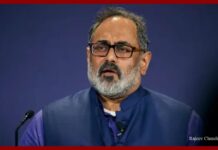New Delhi: In today’s Rajya Sabha session, Member of Parliament Milind Murli Deora raised two critical questions concerning India’s nuclear energy policy and its strategic engagement in the Arctic region.
Deora questioned whether the Indian government was considering global collaborations for the development of Small Modular Reactors (SMRs), Generation 4 Reactors, and advanced fuel technologies. He also inquired about policy reforms that could allow private sector participation in India’s nuclear energy sector and frameworks for Indian scientists and engineers to engage in global skill development programs.
Responding to these questions, Dr. Jitendra Singh, Minister of State in the Prime Minister’s Office, stated: India possesses sufficient in-house expertise for advanced nuclear technologies, including SMRs and Gen 4 Reactors. Therefore, the government is not actively seeking international collaborations in this domain. However, India regularly participates in technical events organised by the International Atomic Energy Agency (IAEA) for knowledge-sharing.
The Minister further stated that the government has no plans to open the nuclear energy sector to full-fledged private participation. Agreements have been signed between India’s Global Centre for Nuclear Energy Partnership (GCNEP) and 16 partner countries to facilitate education and training in nuclear science and engineering. Additionally, the Department of Atomic Energy (DAE) encourages Indian scientists to engage in international conferences, collaboration programs, and publish research in peer-reviewed journals.
Deora also sought details on India’s policy approach to geopolitical developments in the Arctic region, particularly concerning rare earth exploration and maritime opportunities.
In response, Dr. Jitendra Singh, Minister of Science & Technology and Earth Sciences, highlighted India’s growing presence in the Arctic through the National Centre for Polar and Ocean Research (NCPOR), Goa. Key points from his response included: India unveiled its Arctic Policy in 2022, emphasising six pillars: scientific research, climate protection, economic & human development, transportation, governance, and national capacity-building in the Arctic. India has been regularising its presence in the Arctic since December 2023, ensuring year-round scientific expeditions and operations. Indian researchers participated in Central Arctic Ocean Cruises in collaboration with Norway (2022-23). India initiated the Canadian Arctic Expedition in 2023 and 2024. The government closely monitors Arctic developments, particularly rare earth exploration. The Arctic region is known to contain valuable mineral reserves such as copper, phosphorus, niobium, and platinum-group elements. India has engaged with the Arctic Council to strengthen economic and commercial cooperation. Over the last three years, the government has allocated ₹45 crore towards scientific and research activities in the Arctic.
These discussions underline India’s evolving energy and geopolitical strategies, balancing domestic expertise with international engagements in critical sectors.







Puraburn naturally like your web site however you need to take a look at the spelling on several of your posts. A number of them are rife with spelling problems and I find it very bothersome to tell the truth on the other hand I will surely come again again.
kuwin sở hữu kho game đa dạng từ slot đến trò chơi bài đổi thưởng, mang đến cho bạn những giây phút giải trí tuyệt vời.
iwin – nền tảng game bài đổi thưởng uy tín, nơi bạn có thể thử vận may và tận hưởng nhiều tựa game hấp
采用高效谷歌外推策略,快速提升网站在搜索引擎中的可见性与权重。谷歌外推
Khám phá thế giới giải trí trực tuyến đỉnh cao tại MM88, nơi mang đến những trải nghiệm cá cược thể thao và casino sống động.
Khám phá thế giới giải trí trực tuyến đỉnh cao tại MM88, nơi mang đến những trải nghiệm cá cược thể thao và casino sống động.